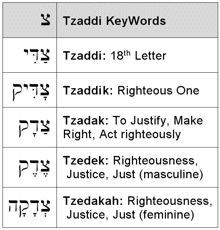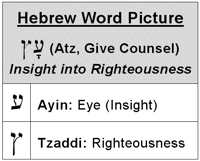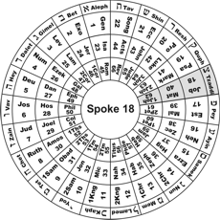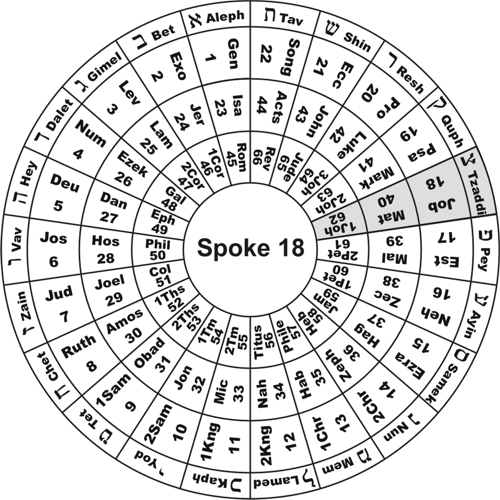Job's Theodicy: The Justification of God
There was a man in the land of Uz, whose name was Job; and that man was
perfect and upright, and one that feared God, and eschewed evil.
Job 1:1 (Spoke 18, Cycle 1)
 The
Divine perfection of God’s Wisdom shines with unparalleled clarity in the placement of the Eighteenth Book.
As noted above, many Jews know the eighteenth letter by the name Tzaddik,
the Righteous One. The Talmud says it represents a righteous man, and Scripture links
it to righteousness in six of the Tzaddi Alphabetic Verses. Rabbi Ginsburgh titled his chapter on Tzaddi
"The Faith of the Righteous One" and subtitled it with the Scripture "the righteous shall live by faith" (Hab 2:4).
Rabbi Munk followed suit with his chapter called "Tzaddi: The Symbol of Righteousness and Humility."
All of these meet in the Book of Job, one of the few humans explicitly declared righteous by God Himself: The
Divine perfection of God’s Wisdom shines with unparalleled clarity in the placement of the Eighteenth Book.
As noted above, many Jews know the eighteenth letter by the name Tzaddik,
the Righteous One. The Talmud says it represents a righteous man, and Scripture links
it to righteousness in six of the Tzaddi Alphabetic Verses. Rabbi Ginsburgh titled his chapter on Tzaddi
"The Faith of the Righteous One" and subtitled it with the Scripture "the righteous shall live by faith" (Hab 2:4).
Rabbi Munk followed suit with his chapter called "Tzaddi: The Symbol of Righteousness and Humility."
All of these meet in the Book of Job, one of the few humans explicitly declared righteous by God Himself:
And the LORD said unto Satan, Hast thou considered my servant Job, that there is none
like him in the earth, a perfect and an upright man, one that feareth God, and escheweth evil?
Job 1:8 (Spoke 18, Cycle 1)
This is the great and overwhelming power of the Capstone of God’s Word. It doesn’t merely prove that the
Bible is the Word of God – it does so by unlocking the Word and opening its vast treasury of Divine Wisdom
with a "demonstration of the Spirit and of power" (1 Cor 2:4). Job is the first of the
Five Wisdom Books, which are aptly named since they contain
nearly half of all references to wisdom in Scripture (BW book pg 95).
They give Divine Counsel through parables, poetry, aphorisms, puns, and enigmatic or "dark" sayings.
Here is how Solomon put it in the central Wisdom Book:
To know wisdom and instruction; to perceive the words of understanding; To receive
the instruction of wisdom, justice (tzedek), and judgment, and equity; ...To understand a proverb,
and the interpretation; the words of the wise, and their dark sayings.
Proverbs 1:2f
The Lord God is the Master Teller of Eternal Tales. He set the historical parable of Job "in the land of Uz"
to direct the careful reader to its purpose, point, and proper interpretation. The name Uz is an exact
pun on the verb utz, (often transliterated as uz) which means take counsel.
The renowned twelfth century Rabbi Moses Maimonides commented on this word and its relation to the
Book of Job in his classic Guide for the Perplexed (pg 296):
First, consider the words "There was a man in the land of Uz." The term Uz has different meanings;
it is used as a proper noun. It is also the imperative of the verb Uz "to take advice." Comp. uzu "to take counsel"
(Isa. 8:10). The name Uz therefore expresses the exhortation to consider well this lesson, study it,
grasp its ideas, and comprehend them, in order to see which is the right view.
Uz is cognate with the Ayin KeyWord etzah (counsel/advice). God used this word when He
answered Job’s complaint, summing up the whole matter at the end of his book:
Then the LORD answered Job out of the whirlwind, and said, Who is this that darkeneth
counsel (etzah) by words without knowledge? Gird up now thy loins like a man;
for I will demand of thee, and answer thou me. Where wast thou when I laid the foundations of
the earth? declare, if thou hast understanding.
Job 38:1f (Spoke 18, Cycle 1)
 The relation of utz (take counsel) to the meaning of its constituent letters is easily
discerned from its simplest cognate, the qal perfect atz (to advise or give counsel).
It consists only of the letters Ayin ( The relation of utz (take counsel) to the meaning of its constituent letters is easily
discerned from its simplest cognate, the qal perfect atz (to advise or give counsel).
It consists only of the letters Ayin ( )
and Tzaddi ( )
and Tzaddi ( ). They combine to form a
lucid Word Picture. The sixteenth letter Ayin denotes the eye, a symbol
of Vision and Insight (BW book pg 293), and since
Tzaddi represents righteousness, the word atz (to give counsel) suggests an Eye for Justice,
Righteous Insight, a Just View, or Insight into Righteousness.
This is, of course, exactly what wise counsel would be, and it is what Maimonides meant by the "right view"
implied by the "land of Uz." All of this integrates with the essential point of Job as a
Divine parable designed to give insight into the exceedingly difficult theology of the
Problem of Evil, the Suffering of the Righteous, and the Justice of God.
Job is one long object lesson – a Divine Counsel – on the Wisdom of God's Righteousness.
Scholars call it a theodicy ). They combine to form a
lucid Word Picture. The sixteenth letter Ayin denotes the eye, a symbol
of Vision and Insight (BW book pg 293), and since
Tzaddi represents righteousness, the word atz (to give counsel) suggests an Eye for Justice,
Righteous Insight, a Just View, or Insight into Righteousness.
This is, of course, exactly what wise counsel would be, and it is what Maimonides meant by the "right view"
implied by the "land of Uz." All of this integrates with the essential point of Job as a
Divine parable designed to give insight into the exceedingly difficult theology of the
Problem of Evil, the Suffering of the Righteous, and the Justice of God.
Job is one long object lesson – a Divine Counsel – on the Wisdom of God's Righteousness.
Scholars call it a theodicy  . .
The outline of Job is extremely simple. Scripture plainly and repeatedly states that Job was righteous,
and that even in the midst of his great suffering, he "sinned not, nor charged God foolishly" (Job 1:22).
Why then did God allow this righteous man to suffer the loss of everything save his own life?
The answer is plain when viewed in context of the whole Bible. Job was allowed to enter into the
sufferings of Christ which is an honor and a Divine service of immeasurable magnitude.
This is why the Apostles rejoiced when "they were counted worthy to suffer shame for his name" (Acts 5:41),
and why Peter could write: "rejoice, inasmuch as ye are partakers of Christ’s sufferings; that, when his glory
shall be revealed, ye may be glad also with exceeding joy." (1 Pet 4:12). Paul summed it all up, saying
"I rejoice in my sufferings for you, and fill up that which is behind of the afflictions of Christ in my
flesh for his body’s sake, which is the church" (Col 1:24).
Job was no less a servant of God than any of the ten thousand martyrs who lost honor, family, and even
their own lives in joyful service of Almighty God. He was simply one of God’s beloved servants who
had such full-ness of faith as to declare with perfect honesty: "Though he slay me, yet will I trust in him" (Job 13:15).
Job was made righteous through faith, and God used His faithful servant to accomplish the great task of writing
eternal Scripture. It is little wonder the Greek Orthodox Church canonized him as "Saint Job the Righteous," that is,
"Saint Job the Tzaddik."
God used Job’s suffering to expose false reasoning about His Righteousness and what it means for
a mortal to be righteous in light of God’s absolute Justice. The answers that Job’s "counselors"
gave for his suffering were as predictable as they were wrong. They all blamed Job! Eliphaz, the first
to respond, explained it this way:
Remember, I pray thee, who ever perished, being innocent? or where were the righteous cut off?
Even as I have seen, they that plow iniquity, and sow wickedness, reap the same.
Job 4:7 (Spoke 18, Cycle 1)
He reminded Job that as a mere man, he necessarily falls short of God’s righteousness:
Shall mortal man be more just than God? shall a man be more pure than his maker?
Job 4:17 (Spoke 18, Cycle 1)
Eliphaz then admonished Job to turn to God, as if lack of faith were the cause of his pains:
I would seek unto God, and unto God would I commit my cause: Which doeth great things
and unsearchable; marvellous things without number:
Job 5:9 (Spoke 18, Cycle 1)
This was nothing but salt in Job's wounds. The irony was not lost on him, for he knew that
he was doing this very thing – praying and seeking God – when the calamities fell upon him! His integrity
forced him to defend himself. This was the heart of his problem: his conscience was clear,
yet he suffered still. How are we to understand this? It was at this point that Bildad repeated
the assertion that the only possibility, in light of God's eternal Righteousness, was that
Job's suffering must be due to his own sin:
How long wilt thou speak these things? and how long shall the words of thy
mouth be like a strong wind? Doth God pervert judgment? or doth the Almighty pervert justice (tzedek)?
If thy children have sinned against him, and he have cast them away for their transgression;
If thou wouldest seek unto God betimes, and make thy supplication to the Almighty; If
thou wert pure and upright; surely now he would awake for thee, and make the habitation of
thy righteousness (tzedakah) prosperous.
Job 8:2ff (Spoke 18, Cycle 1
Job answered as would any modern Christian who knows we have the righteousness of Christ even as
we remain weak and subject to sin and suffering. Job admitted his own shortcomings and declared the
perfection of God and His Righteousness:
I know it is so of a truth: but how should man be just (tzadak) with God?
If he will contend with him, he cannot answer him one of a thousand. ... How much less
shall I answer him, and choose out my words to reason with him? ... though I were righteous (tzaddik),
yet would I not answer, but I would make supplication to my judge. ...
If I justify (tzadak) myself, mine own mouth shall condemn me: if I say,
I am perfect, it shall also prove me perverse.
Job 9:2ff (Spoke 18, Cycle 1)
Look at the beauty of Job’s dilemma. He knew of no personal sin to account for his suffering,
but he also knew that he could not justify himself without his own tongue condemning him! This
is the problem faced by every Christian justified by faith in Christ. Job’s problem is our
problem. If our claim to righteousness by faith is taken out of context or poorly stated
(as in the doctrine of Christian Perfectionism), it will sound like we are justifying ourselves, which,
if we do, we make God a liar. God engraved a geometrically correlated witness to this doctrine in
the Capstone of His Word. He specifically addressed the sin
of self-justification in the opening chapter of 1 John using almost exactly
the same language found in Job. It sets the tone for his whole Epistle:
If we say that we have no sin, we deceive ourselves, and the truth is not in us.
If we confess our sins, he is faithful and just to forgive us our sins, and to cleanse us from all
unrighteousness. If we say that we have not sinned, we make him a liar, and his word is not in us.
1 John 1:8f (Spoke 18, Cycle 3)
 Both Job and 1 John present the problem in almost identical language: "If I say I am perfect" and
"If we say we have not sinned." Both speak specifically of the sin of self-justification.
A simple search of the KJV for all verses that use the form "If I (or we) say" near the
words "just" or "justify" selects only the verses quoted above. They are unique in the Bible,
which means we have a Spoke 18 KeyLink based on the primary symbolic meaning of Tzaddi
that God 1) established in the Alphabetic Verses and 2) interwove in the
correlated themes of these two Books. Space and time prohibits a further analysis
of Job, so let us skip to its end to hear how God answered him: Both Job and 1 John present the problem in almost identical language: "If I say I am perfect" and
"If we say we have not sinned." Both speak specifically of the sin of self-justification.
A simple search of the KJV for all verses that use the form "If I (or we) say" near the
words "just" or "justify" selects only the verses quoted above. They are unique in the Bible,
which means we have a Spoke 18 KeyLink based on the primary symbolic meaning of Tzaddi
that God 1) established in the Alphabetic Verses and 2) interwove in the
correlated themes of these two Books. Space and time prohibits a further analysis
of Job, so let us skip to its end to hear how God answered him:
Then answered the LORD unto Job out of the whirlwind, and said, Gird up thy loins now
like a man: I will demand of thee, and declare thou unto me. Wilt thou also disannul my judgment?
wilt thou condemn me, that thou mayest be righteous (tzaddik)?
Job 40:6f (Spoke 18, Cycle 1)
The first Book on Spoke 18 is based entirely, from beginning to end,
on the symbolic meaning of its corresponding letter Tzaddi as a
symbol of Righteousness. The miracle of God is that this theme dominates all
three Books on Spoke 18, as a review of the artilces on the sidebar quickly demonstrates.
| 


